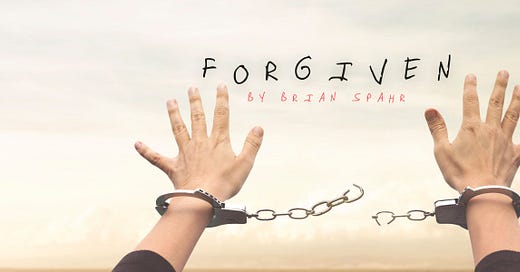If God’s forgiveness is really not dependent on anything we could ever do ourselves, then why do we need to ask for it?
When I was a pastor, I would often lead our congregation in the following prayer of confession as part of our worship gathering:
Gracious God, our sins are too heavy to carry, too real to hide, and too deep to undo. Forgive what our lips tremble to name, and what our hearts can no longer bear. Set us free from a past that we cannot change; open to us a future in which we can be changed; and grant us grace to grow more and more in your likeness and image; through Jesus Christ, the light of the world. AMEN
Then I would announce, “Friends, we are God’s forgiven people; not because of anything we could do ourselves, but by what Christ has done for us on the cross.”
It was always such a meaningful experience to lead and participate in. It always felt like a collective weight was lifted off of the congregation in those moments, and together we experienced freedom.
At the same time, my mind often questions. I ask,
“If God’s forgiveness is really not dependent on anything we could ever do ourselves, then why do we need to ask for it? Does God forget? Or is there actually a requirement… even one as seemingly simple as asking for it to that which Jesus proclaims is given to us freely?”
In what we now call “The Lord’s Prayer,” Jesus teaches us to pray. “forgive us our debts.” Bear with me while I nerd out for a second, but check this out:
In the original language of the Lord’s prayer, the word “forgive” is a verb (an action word) in the aorist tense (which implies a successful action). And it’s not just in the aorist tense it is in the aorist imperative tense which implies that this successful action has been accomplished once and for all and it is in the active voice which implies that this has happened and is happening still here and now. So we pray “forgive us”, not to beg God to do what God has already done. We pray “forgive us”, not to remind God so God doesn’t forget. We pray “forgive us” to speak this into our present reality. It is a proclamation as much as it is a request. It reminds us that THIS is who we are. We ARE God’s forgiven people. We are no longer defined by our debt or burdened by it. God has made our forgiveness true once and for all! WE ARE FORGIVEN. But we lose the plot. We drift off course and WE need to be renewed and reassured of God’s promise, so we pray. This (and the whole of the prayer) teaches a way of praying that acknowledges certain things about God and directs the heart of our prayers to be in line with God and God's will. It is a way of praying that makes it challenging to force our own agenda. We don’t pray for God’s forgiveness because God needs to be reminded of his promise to forgive as God has already made this our reality.




